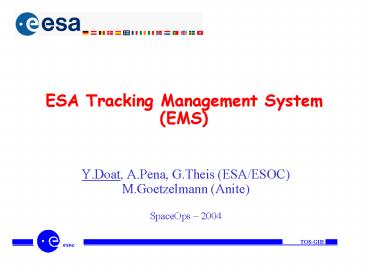ESA Tracking Management System EMS - PowerPoint PPT Presentation
1 / 21
Title:
ESA Tracking Management System EMS
Description:
Online. ESTRACK. Management. Non ESA. Agency. EMS Users. Managed. Facilities. Ground Stations ... Radio Science. Shadow Tracking. Data Flow Test. Simulation ... – PowerPoint PPT presentation
Number of Views:27
Avg rating:3.0/5.0
Title: ESA Tracking Management System EMS
1
ESA Tracking Management System (EMS)
- Y.Doat, A.Pena, G.Theis (ESA/ESOC)
- M.Goetzelmann (Anite)
- SpaceOps 2004
2
ESTRACK - 1
Dedicated Stations
LEOP Stations
ESOC Control Center
3
ESTRACK - 2
4
Evolution of ESTRACK Operations (2002)
CLU
VIL1
AGO
KRU
XMM
PER
VIL2
ERS2
KIR15
Station manned
KIR13
5
Evolution of ESTRACK Operations (2004)
CLU
CLU
VIL1
SM1
MSP
XMM
RED
INTG
AGO
KRU
MEX
PER
VIL2
ROS
DSN
ext
NNO
MSG
DSP
TS-1
MAL
ENV
SVAL
ERS2
KIR15
ASTR-F
KIR13
6
EMS Environment
Flight Dynamics
External Provider
7
Process and Interaction Model
EMS
Non ESA Agency
EMS Users
Interaction with Users
Interaction with External Providers
Online ESTRACK Management
8
EMS Role
- Planning and SchedulingBased on the User
Requests, the EMS prepare the schedule based on
the facilities and their status. - Schedule executionThe schedule is downloaded to
the facility for execution. - Schedule execution monitoringThe EMS monitors
the execution of the schedule and logs the
execution steps.
9
EMS Facilities
Front End
Return Link
TM BE
- Ground-Station
- Front-End
- Ranging equipment
- Forward/Return Link
- TM/TC Back-end.
RG
Forward Link
TC BE
- Communication
- Available bandwidth
- Link Redundancy.
10
Mission Model
ESTRACK Services are only provided in the
framework of a Mission Agreement.
EMS Configuration Database
11
Mission Agreement in EMS
MISSION AGREEMENT
Identifier, Spacecraft, Validity
Period Administrative configuration information
Global constraints (Temporal, Resource, )
Priority (relative to other missions) Preference
(relative to other stations)
NCTRS
12
User Service
USER SERVICE
- For Instance
- Telemetry
- Telecommand
- Ranging Calibration
- Ranging / Doppler
- RCF Timely Online
- VC 0
- RCF Complete
- Online VC 1
- CLTU
- Examples
- every pass over
- KIR of more than 5
- minutes
- Continuous cover-
- age by PER, KRU,
- AGO with 15 min
- handover
- 8 hours two times a
- week
13
User Service Definition (What)
USER SERVICE DEFINITION
14
Operational Service Types
- Exposed Services
- Telemetry Reception
- Telemetry Recording
- Online Transfer Completion
- Offline Telemetry Retrieval
- Telecommand Uplink
- Ranging Calibration
- Ranging
- Tracking Data Retrieval
- Radio Science
- Shadow Tracking
- Data Flow Test
- Simulation
- An OS identifies a basic TTC service that can be
provided by ESTRACK to a user mission.
Supporting Services Forward Link
Processing Return Link Processing Tracking
15
Planning Directive Example
16
EMS Processing
- Mission Planning Cycle
- User Requests are combined into a schedule
- The resulting schedule is sent back to the
Utilization Managers
- The Utilization Managers may submit new User
Requests
- Once finalized, the schedule is executed.
17
Cross Support
User Requests
External Requests
EMS
- Provide Services to non-ESA users
- EMS processes non-ESA Service Requests (SLE
Management) - ESA Resources offer Services based on SLE Data
Transfer. - Obtain Services from non-ESA providers
- EMS sends external requests to an external
provider (SLE Management) - Services based on SLE Data Transfer.
18
Planning Policies
- At least one standing order must be implemented
for each mission and each user service (ESTRACK
must not be oversubscribed) - The ESA network should be used to saturation for
ESA missions - No global optimisation is required
- No alternative solutions are proposed to the user
- The planning process shall maximise the coverage
by each station and minimise the number of
station handover activities in the plan - If no solution can be found the operator can
- enable degraded service definitions / standing
order pairs - modify constraints to find a solution
19
EMS Design Constraints
- ESA Ground Operation Software
- The ground-segment services offered by the system
will be clearly identified to fit in the ESA
ground-segment service approach. - Platform independent The system will be
developed on Solaris 8 and ported to Linux to
demonstrate the platform independency. - Software reusability Software of other
components should be reused (e.g. logging,
Man-Machine interface).
20
Planning
2004 Semester 1
2004 Semester 2
2005 Semester 1
2005 Semester 2
2006 Semester 1
Requirements
Development
Start of Operations
21
Questions
?































